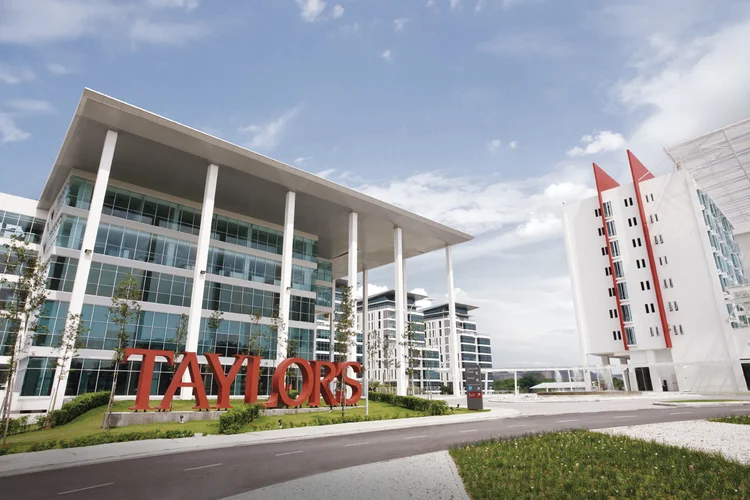KPT/JPS (N/0910/6/0007) (MQA/PA17443) 07/29
BACHELOR OF APPLIED HEALTH SCIENCES (HONOURS)
OVERVIEW
Introducing our new Applied Health Sciences degree with specialisations, as the first of its kind in Malaysia to offer specialisations in four unique areas. This innovative programme is designed to equip you with essential knowledge and skills to shape the future of healthcare and positively impact global health. Our curriculum nurtures competent professionals, emphasising practical applications in applied health sciences research, applied health sciences practice, and entrepreneurship.
With our comprehensive programme and specialised tracks, acquire the expertise needed to thrive in various applied health science fields. Neuroscience enhances our understanding of brain health and cognitive function, essential for maintaining mental well-being and lifelong productivity, while Nutrition unlocks the power of food to fuel peak performance and support long-term vitality. Embryology and Genetics provide insights into the origins of health and disease, allowing us to detect concerns early and design personalised treatment plans. Together, these specialisations foster a healthier and more resilient society, capable of leading active, fulfilling lives.
School
Biosciences
Intake Month
April and September
Study Options
Full-time only
Specialisations
Genetics, Embryology, Neuroscience, Nutrition
Study Programme
3-year
Australia
PROGRAMME OVERVIEW
PROGRAMME STRUCTURE
The Applied Health Sciences degree programme is designed to equip you with a comprehensive and nuanced understanding of diverse applied health sciences disciplines to ensure enhanced employability and your readiness for success in this field. Starting with a solid foundation in basic applied health sciences, the programme guides you on a systematic journey toward mastery through specialised modules.
Primary Major
This component consists of Common Core subjects, which are common modules across a discipline that provides fundamental knowledge of the discipline.
Common Core
- Cell Biology
- Fundamentals of Chemistry
- Introduction to Microbiology
- Human Anatomy and Physiology
- Basic Pharmacology and Toxicology with Health Informatics
- Principles of Biochemistry
- Principles of Genetics
- Introduction to Biostatistics
- Science Communication and Ethics
- Design, Data and Decisions
- Research Project
- Understanding Entrepreneurialism
- Industrial Attachment
Note:
- This programme does not grant Malaysian Allied Health Professions Council (MPKBM) registration.
- All information is subject to change. Readers are responsible for verifying information that pertains to them by contacting the university.
University Core
This component aims to develop critical thinking, build up social intelligence, and cultivate civic responsibility as well as broaden cultural knowledge. It consists of compulsory and nationally mandated study modules required by the Malaysian Ministry of Higher Education.
- Penghayatan Etika dan Peradaban / Bahasa Melayu Komunikasi 2
- Falsafah dan Isu Semasa
- Emotional Intelligence in Action
- Kursus Integriti Dan Antirasuah
- Social Innovation Project
Note:
- Students are requested to take Bahasa Kebangsaan A if they do not obtain a Credit for Bahasa Malaysia in SPM.
- All information is subject to change. Readers are responsible for verifying information that pertains to them by contacting the university.
Specialisations
Genetics
- Molecular Biology Techniques and Applications
- Stem Cell Biology
- Applications of Bioinformatics
- Clinical Genetics
- Cancer Genetics
- Microbial Genetics
- Research and Lab Management
- Processes in Disease
- Principles of Developmental and Reproductive Biology
- Endocrinology for Health Sciences
- Human Andrology and Embryology Laboratory
- Immunology and Serology
- Human Reproductive Cryobiology
- Human Embryonic Development
- Research and Lab Management
- Processes in Disease
- Functional Neuroanatomy
- Introduction to Neuroscience
- Cognitive Psychology
- Biological Psychology
- Neural Information Processing
- Neuropharmacology
- Research and Lab Management
Year 3
- Processes in Disease
Nutrition
Year 1
- Introduction to Human Nutrition
- Diet, Nutrition and Lifestyle
- Applied Nutrition
- Nutrition in Health and Disease
- Nutraceuticals and Functional Food
- Community Nutrition
- Research and Lab Management
- Processes in Disease
Note:
- This programme does not grant Malaysian Allied Health Professions Council (MPKBM) registration.
- All information is subject to change. Readers are responsible for verifying information that pertains to them by contacting the university.
Flexible Education
The Flexible Education component offers students the flexibility to explore modules in a related or unrelated field, enhancing and complementing their primary major. This component allows students to broaden their knowledge and skills by selecting modules from the same or different schools within the university.
Flexible Education can take various forms, including free electives, extensions, minors, or even a second major. These options provide students with the opportunity to delve deeper into a specific area of interest or broaden their understanding by exploring a different field of study.
Click here to see a full list of all available Flexible Education Components.
You will need to choose one of the packages below.
Minor
You will need to select any Minor packages offered by Taylor’s University. We have provided some suggested Minors below, and you can refer to the Flexible Education Guide for the complete list.
- Mass Communication
- Education
- Event Management
- International Business
- Management
- Finance
- Marketing
- Psychology
- Cosmetic Science
- Pharmaceutical Industry Practice
Note: The minors offered are subject to availability and you will need to meet the minimum module pre and co-requisites.
Free Electives
You will need to select any five (5) of the Free Electives offered by Taylor’s University. You can refer to the Flexible Education Guide for the complete list.
Note: The free electives offered are subject to availability and you will need to meet the minimum module pre and co-requisites.
ENTRY REQUIREMENTS
Are you ready to take the next step in your academic journey? Our programme offers an exciting opportunity for individuals passionate about the applied health sciences field. To ensure a smooth admission process, please take note of our entry requirements listed below.
Prerequisites
Pass SPM//O-level or equivalent with 5 credits (Except for UEC)
SPM / O-Level with Diploma
Pass SPM/O-level or equivalent with 3 credits for entry with Diploma qualification
Note:
All information is subject to change. Readers are responsible for verifying information that pertains to them by contacting the university.
Entry Pathway
Taylor’s Foundation in Science (FIS)
Pass with min. CGPA 2.50 including GPA 2.33 in (ANY 2) subjects: Biology, Physics / Mathematics, Chemistry
Sijil Tinggi Persekolahan Malaysia (STPM)
Min. GPA 2.33 in (ANY 2) subjects: Biology, Physics / Mathematics, Chemistry
Unified Examination Certificate (UEC)
Pass with min. 5Bs including (ANY 2): Biology, Physics / Mathematics, Chemistry
A Level
Min. DD in (ANY 2) subjects: Biology, Physics / Mathematics, Chemistry
AUSMAT (SACEi)
ATAR 60 with min. Grade C+ each in (ANY 2) subjects: Biology, Physics / Mathematics, Chemistry
Canadian Pre-University (CPU)
Min. average of 60% in 6 subjects including min. 65% each in (ANY 2) subjects: Biology, Physics / Mathematics, Chemistry
International Baccalaureate (IB)
Min. 24 points in 6 subjects including min. 5 points at Higher Level (HL) in (ANY 2) subjects: Biology, Physics / Mathematics, Chemistry
Matriculation in Science
Min. GPA 2.33 in (ANY 2) subjects: Biology, Physics / Mathematics, Chemistry
MUFY
Overall 55% including 65% each in (ANY 2) subjects: Biology, Physics/Mathematics, Chemistry
Other Qualifications
Students with other qualifications will be considered on a case-by-case basis.
All information is subject to change. Readers are responsible for verifying information that pertains to them by contacting the university.
English Requirements
Band 5.5
MUET
Band 3
Pre-University / Diploma
Completed Pre-University / Diploma that was conducted in English.
Cambridge English/ELS
the minimum score varies by programme
Note: All information is subject to change. Readers are responsible for verifying information that pertains to them by contacting the university.
OVERSEAS TRANSFER OPTIONS
We provide the option for you to complete your Applied Health Sciences degree through our trusted partner university in Australia.
Australia 🇦🇺
The University of Sydney
- Bachelor of Science * | 1 + 2 years
- Bachelor of Science / Bachelor of Advanced Studies * | 1 + 3 years
- Bachelor of Science (Health) | 1 + 2 years
- Bachelor of Science / Bachelor of Advanced Studies (Health) | 1 + 3 years
- Bachelor of Science (Medical Science) | 1 + 2 years
- Bachelor of Science / Bachelor of Advanced Studies (Medical Science) | 1 + 3 years
*Recommended Sydney majors/minors: Anatomy and Histology, Applied Medical Science, Biochemistry and Molecular Biology, Biology, Chemistry, Ecology and Evolutionary Biology, Food Science, Genetics and Genomics, Immunology and Pathology, Infectious Diseases, Life Sciences (programme), Medicinal Chemistry, Microbiology, Nutrition Science, Pathology, Pharmacology, or Physiology
Note: Some Articulation Pathways require completion of specific subjects at TU
FUTURE CAREERS
When you’ve successfully completed this Applied Health Sciences degree programme, you could embark on any of these exciting careers, including:
Genetics
- Molecular Geneticist
- Pharmacogeneticist
- Genetic Laboratory Manager
- Pharmacogenomics
- Bioinformatics Specialist
- Genetic epidemiologist
- Genomic Data Analyst
- Genetic Engineering Specialist
Embryology
- Developmental Biologist
- Embryo Cryopreservation Specialist
- Research Scientists
- Assisted Reproductive Technology (ART) Specialist
- Embryology Quality Control Specialist
- IVF Laboratory Coordinator
- Laboratory Manager
- Family Planning Officer
Neuroscience
- Neuroscientist
- Neuropharmacologist
- Neurotechnologist
- Neuroimaging Specialist
- Cognitive Neuroscientist
- Electroneurodiagnostic Technologist
- Neuroinformatics Specialist
- Neuro-products Specialist
- Laboratory Manager
Nutrition
- Public Health Nutrition Specialist
- Nutritional Epidemiologist
- Nutrigenomics Specialist
- Health Promotion Specialist
- Research Scientists
- Nutri-preneur
- Laboratory Manager
- Nutrition Promotion Coordinator
- Retail Nutrition Insights
FAQ
How does the programme differ from other applied health sciences programmes in Malaysia?
Our programme stands out due to its comprehensive approach, offering specialisations in four distinct areas, along with an emphasis on integrated practical training and a holistic understanding of healthcare.
How is the programme keeping up with advancements in applied health sciences and technology?
The curriculum is developed in collaboration with industry experts, ensuring it remains current and relevant. Students are exposed to cutting-edge technologies and emerging trends.
Can students choose multiple specialisations or switch between them?
The programme is designed to allow students to focus on one specialisation; however, there may be opportunities for interdisciplinary projects or elective courses to explore other areas.
Can graduates pursue advanced degrees in their chosen specialisations?
Yes, graduates have the option to pursue advanced degrees such as master’s or doctoral programmes in their specific specialisations or related fields.
How does the Applied Health Sciences programme differ from Biomedical Science?
While both programmes share foundational elements, Applied Health Sciences offers specialisations in Genetics, Neuroscience, Embryology, and Nutrition, providing a more focused and diverse approach to basic healthcare. Biomedical science is a disease-oriented discipline; thus, the Biomedical Science programme is recognised for registration under the Malaysian Allied Health Professions Council (MAHPC)
Can you explain the key specialisations in the Applied Health Sciences programme compared to Biomedical Science?
Applied Health Sciences offers specialisations in Genetics, Neuroscience, Embryology, and Nutrition, allowing students to delve deeper into these specific areas, while Biomedical Science provides a broader overview of various biomedical disciplines.
- Genetics Specialisation: Gain insights into the genetic basis of diseases, genetic counselling, and cutting-edge genetic technologies. Opportunities abound in healthcare, research institutions, pharmaceutical companies, and academia, where you can contribute to breakthroughs in personalised medicine and unravel the genetic components of diseases.
- Neuroscience Specialisation:Explore the intricacies of the human brain, studying neural pathways, synaptic transmission, brain-behaviour relationships, and neurological disorders. Prepare for careers as neuroscientists or neuropsychologists, engaging in groundbreaking research, patient care, and neuroscience education to advance brain health.
- Embryology Specialisation: Delve into the miracle of life through in-depth courses on embryonic development, prenatal care, and reproductive technologies. Open doors to careers in embryology, reproductive medicine, and stem cell research, contributing to advancements in reproductive health and human development.
- Nutrition Specialisation: Investigate the impact of nutrition on health and wellbeing, exploring dietary requirements, metabolism, and disease prevention. Prepare for roles as nutritionists, public health advocates, or dietary consultants, promoting healthy lifestyles and addressing global nutrition and food security challenges.
Is there a significant difference in the curriculum content between the two programmes?
Yes, there are differences. The Applied Health Sciences curriculum is tailored to each specialisation, providing in-depth knowledge, while Biomedical Science covers a broader spectrum of biomedical disciplines.
Are the career prospects different between the two programmes?
Yes, the career prospects differ. Applied Health Sciences graduates may find opportunities in genetic counselling, neuroscience research, embryonic development, and nutrition science, while Biomedical Science graduates may have a broader range of options in disease-orientated disciplines within biomedical research, clinical laboratories, and healthcare manageme
Dr Lee Sau Har, Programme Director
This innovative programme is designed to equip you with essential knowledge and skills to shape the future of healthcare and positively impact global health.
APPLY NOW
Embarking on your journey towards a Bachelor of Applied Health Sciences degree represents an exhilarating advancement in your educational and professional career. We are here to guide you through the application process, ensuring it is as seamless and straightforward as possible. To discover more about the procedure and the documents required, please visit our Admissions website for further information.














